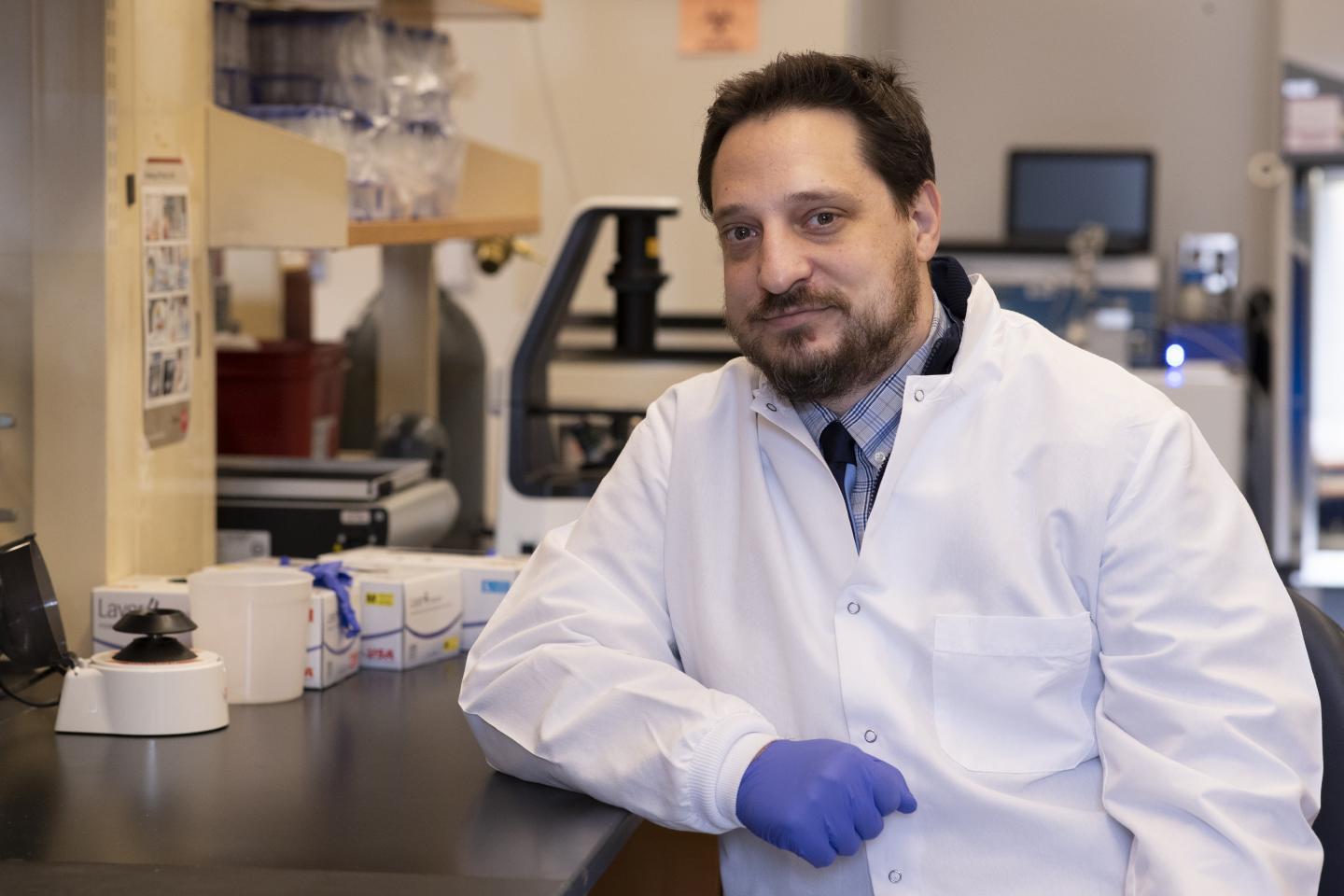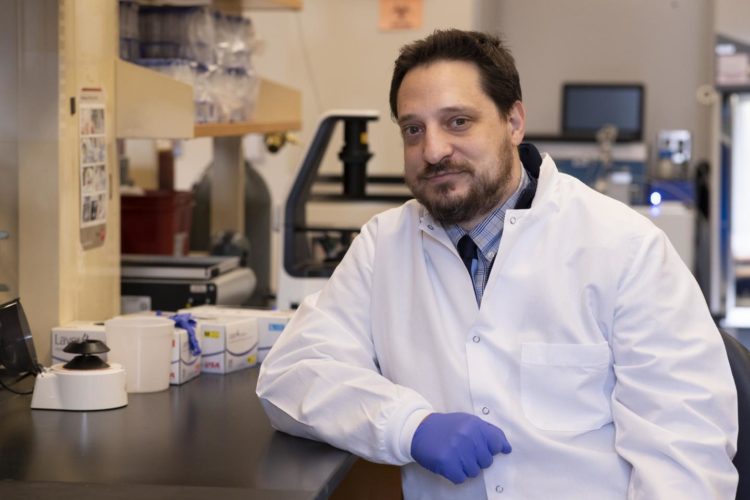Scientists find unexpected connection between 2 main forms of AMD

Credit: Dan Addison | UVA Communications
Researchers have successfully treated age-related macular degeneration (AMD) in mice after finding an unexpected link between the two main forms of the blinding eye disease, the leading cause of vision loss in people 60 and older.
Researcher Brad Gelfand, PhD, of the University of Virginia School of Medicine and the UVA School of Engineering, cautions that his team is far from being able to use the approach in patients with AMD, but he is excited about the potential it holds. “It’s not as if this is the final answer to the problem, but it’s certainly a big step along the way, hopefully,” he said.
‘Equal Parts Excitement and Disbelief’
The new discovery links the “dry” and “wet” forms of macular degeneration in a surprising way. Gelfand has focused primarily on the more common, and currently untreatable, dry form. But after making a discovery about dry AMD, he went on to determine that the finding held true for wet AMD as well. “It was almost chance – we were like, ‘Why don’t we just go ahead and look for wet?’ When we first saw the results, I was very surprised,” he said. “Initially, it was equal parts excitement and disbelief.”
Gelfand, of UVA’s Center for Advanced Vision Science, found that the absence of a particular enzyme could drive both forms of AMD. The enzyme, called Dicer, is lost with age, and that loss leads to an overgrowth of blood vessels in the retina and other damage, he and his team determined.
The discovery was so unexpected he wanted to confirm. “We weren’t really satisfied with just one system,” he said. “We actually got a different model that had originated from a totally different lab, in Japan, and found the same exact thing. Then we went back to some of our old models where we had gotten rid of Dicer and found the same exact thing.”
An Enzyme to Stop Macular Degeneration
Gelfand was able to restore the enzyme in mice by adapting a form of gene therapy already used to treat other eye diseases in people. His work suggests that a similar approach could treat both forms of AMD, but much more testing will need to be done to determine a potential treatment’s safety and effectiveness. If successful, though, it would be the first treatment for dry age-related macular degeneration and could significantly improve treatment for wet AMD.
“As it stands, patients with [wet] AMD have to undergo frequent injections into their eye, which can be painful and comes with some risks. They have to come to the eye doctor once a month or every other month. A lot of these people can’t drive. So it’s a huge burden,” he said. “The idea behind using gene therapy like the one we propose is that one treatment would last for a very long time. It’s a sustained therapy. So we can improve their vision and reduce the number of doctor’s visits they have to make.”
Developing a Dicer-based treatment will likely take several years if all goes well. For now, though, Gelfand’s discovery has shed important light on the poorly understood relationship between the two forms of AMD. “It certainly solidifies the idea that wet and dry AMD share a lot of mechanisms,” he said. “It’s something that researchers today are still trying to grapple with – why might one person have wet AMD and one person have dry. Sometimes it’s the case that the same person has wet in one eye and the other eye has dry. Sometimes the same eye has both. This adds another important piece of evidence that the underlying mechanisms of these two processes are really tightly linked.”
AMD Findings Published
The researchers have described their findings in an article in the scientific journal Proceedings of the National Academy of Sciences (PNAS). The research team consisted of Charles B. Wright, Hironori Uehara, Younghee Kim, Tetsuhiro Yasuma, Reo Yasuma, Shuichiro Hirahara, Ryan D. Makin, Ivana Apicella, Felipe Pereira, Yosuke Nagasaka, Siddharth Narendran, Shinichi Fukuda, Romulo Albuquerque, Benjamin J. Fowler, Ana Bastos-Carvalho, Philippe Georgel, Izuho Hatada, Bo Chang, Nagaraj Kerur, Balamurali K. Ambati, Jayakrishna Ambati and Gelfand.
###
The research was supported by National Institutes of Health grants R01EY028027, DP1GM114862, R01EY022238, R01EY024068, R01EY028027, R01EY029799, K99EY024336, R00EY024336, T32 HL007284, R01EY017950 and R01EY017182; American Heart Association grant 13SDG16770008; John Templeton Foundation grant 60763 and the DuPont Guerry III Professorship.
Gelfand, of UVA’s Department of Ophthalmology and the Department of Biomedical Engineering, and several of his collaborators are seeking patents related to their discovery. A full list of disclosures from the research team is available in the PNAS paper or by request.
To keep up with the latest medical research news from UVA, subscribe to the Making of Medicine blog at http://makingofmedicine.
Media Contact
Josh Barney
[email protected]
434-906-8864
Original Source
https:/
Related Journal Article
http://dx.





